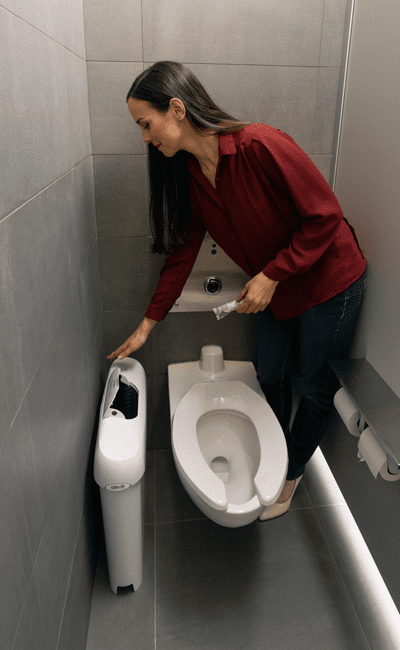Table of Contents
Washroom and sanitary waste hygiene
Proper sanitary waste management is very important when it comes to collecting and disposing of sanitary waste safely and hygienically. Not only does this help to ensure a clean and hygienic washroom environment, but the management of sanitary waste is also subject to a number of legal requirements as outlined by UK law.
Some companies do not realise that they have a duty of care to their employees and visitors to their premises, part of which is to provide adequate sanitary bins for effective sanitary waste management.
Are sanitary waste disposal bins required by law in UK businesses?
Yes, businesses in the UK are legally required to provide appropriate facilities for the collection and disposal of sanitary waste if they have female employees or visitors, in accordance with sanitary waste laws. This requirement is outlined in several sanitary waste disposal regulations, including:
- The Workplace (Health, Safety and Welfare) Regulations Act 1992.
- The Water Industries Act 1991.
- The Environmental Protection Act 1990.
Failure to adhere to the rules and regulations outlined in these acts can lead to hefty fines.
Rules and regulations around the disposal of sanitary waste
The Workplace (Health, Safety and Welfare) Regulations 1992
These regulations specify that all companies must provide an appropriate means of disposal for sanitary products in female washrooms. This can include providing sanitary bins and sanitary bags.
Why is this important?
Without proper facilities, businesses risk encouraging improper disposal of sanitary products, such as flushing them, which can result in:
- Plumbing issues such as blockages.
- Health hazards.
- Increased maintenance costs.
- A poor washroom experience for users, which can damage a company’s reputation.
Businesses must ensure proper sanitary bin collections to meet their legal duty of care requirements.
Without these facilities, employees and visitors may resort to improper disposal methods, increasing the risk of plumbing issues and regulatory breaches.
Example in Practice:
A small office with limited resources still must provide a designated sanitary bin. The use of reputable waste management services ensures proper compliance and hygiene.
The Water Industries Act 1991
This act prohibits the disposal of materials likely to block sewer or drain systems, including sanitary products, by flushing them down toilets. Businesses must provide sanitary disposal facilities to discourage such behaviour, as sanitary products are among the most common causes of sewer blockages in the UK.
Why is this Important?
Improper disposal of sanitary waste via toilets can lead to:
- Severe sewer blockages.
- Environmental contamination.
- Costly repairs for businesses and local authorities.
Providing appropriate facilities helps to prevent these issues while promoting environmentally responsible practices.
Example in Practice
A hotel chain faced frequent plumbing issues due to guests flushing sanitary products. They introduced clear signage in washrooms alongside discreet sanitary bins and partnered with a professional waste management company. As a result, they significantly reduced plumbing costs and improved their guests’ satisfaction.
The Environmental Protection Act 1990
This act requires businesses to manage all waste produced on their premises responsibly, including sanitary waste. It also mandates that sanitary waste is collected and disposed of by a licensed carrier. Businesses must retain waste transfer notes for at least two years to demonstrate compliance.
Sanitary waste is classed as ‘controlled waste’, so companies must ensure that this waste is segregated and not disposed of in general waste bins.
Why is this Important?
Improper management of sanitary waste can lead to serious environmental and legal consequences, including:
- Pollution of water sources, land, or air.
- Health hazards for waste handlers or the public.
- Regulatory fines for failing to meet compliance standards.
By adhering to the act, businesses can avoid these risks while demonstrating their commitment to environmental stewardship—a growing priority for employees and customers.
Outsourcing sanitary waste management to an expert provider ensures businesses meet their obligations efficiently and stay compliant.
Example in Practice
A healthcare facility was fined for improperly storing sanitary waste, which attracted vermin and led to complaints from neighbouring businesses. After engaging a licensed waste disposal provider, they implemented compliant storage, disposal practices, and proper record-keeping, restoring their reputation and avoiding further penalties.
How to dispose of sanitary waste
There are strict sanitary waste disposal requirements in the UK, especially in the workplace and other public areas. A separate sanitary bin should be provided in washrooms to encourage proper disposal of feminine hygiene products such as tampons and pads.
All sanitary waste management must be taken care of by a licensed carrier, such as Citron Hygiene. Outsourcing sanitary waste management to an expert external provider can take away the stress from your own facilities management team and ensure that you stay the right side of the law. For example, licensed sanitary waste disposal experts understand that documentation must be completed and kept on record for a minimum of two years after collection.
A common misconception is that informal disposal methods, such as using regular waste bins, are sufficient. In reality, this can result in hefty fines and potential damage to a brand’s reputation. Professional services ensure compliance with rules and standards, reducing the risk of costly penalties. Comprehensive sanitary bin collection services cater to different business sizes and need across the UK, emphasising timely and responsible disposal.
Can cleaners empty sanitary bins?
While cleaners play a crucial role in maintaining washroom hygiene, handling liquid or solid waste, including sanitary waste, often requires specific protocols and training. Sanitary waste can be classified as hazardous waste and may pose health risks if not managed properly. UK regulations, including the Environmental Protection Act 1990, outline strict procedures for handling and disposing of sanitary waste.
For this reason, it’s recommended that only licensed waste carriers manage sanitary waste disposal. These professionals are trained to handle sanitary bins and follow rigorous procedures to ensure safety and compliance. Using an external provider also protects cleaners from potential exposure to hazardous materials and ensures adherence to legislation.
How often should sanitary waste bins be emptied?
This will depend on various factors, such as:
- Usage rate of the washroom: High-traffic areas like shopping centres or large office buildings will require more frequent service.
- Size and capacity of the sanitary bins: Smaller bins may need more frequent servicing compared to larger ones.
For low-traffic washrooms, a bi-weekly or monthly service might be appropriate. In high-traffic environments, weekly or even more frequent servicing is recommended. A professional sanitary disposal service provider can assess usage patterns and make tailored recommendations for bin size and service frequency.
For example, if your washroom has a low number of visitors then a small feminine hygiene unit might be ideal. However, in a large office building, it may be better to provide a large sanitary waste unit.
Example in practice:
A small boutique office with fewer visitors might benefit from a compact sanitary bin emptied monthly. Conversely, a large shopping mall would need larger bins and weekly servicing to accommodate higher volumes of waste effectively.
Support period dignity in your washroom
Provide free menstrual products to your staff & customers
Finding a sanitary hygiene services provider
Citron Hygiene revolutionised feminine hygiene in 1955 when we introduced the first feminine hygiene disposal units and we have continued to be an industry leader in the field of sanitary waste ever since. Today, our range includes stylish, compact sanitary bins designed to fit discreetly into washroom spaces while providing exceptional hygiene.
Feminine hygiene has evolved from being about collection of feminine waste and odour control to minimising the spread of germs and designed FHUs that are stylish and compact, to maximise the limited space that’s often available in washroom cubicles. We provide a range of discreet and stylish sanitary bins, backed up by our liner exchange service meaning your units always stay on site. With every sanitary bin service, our technicians will collect your waste for disposal, cleaning your units and replacing the liners too.
If you would like to discuss your sanitary waste collection and disposal requirements, then please contact our team who will be happy to help you.

